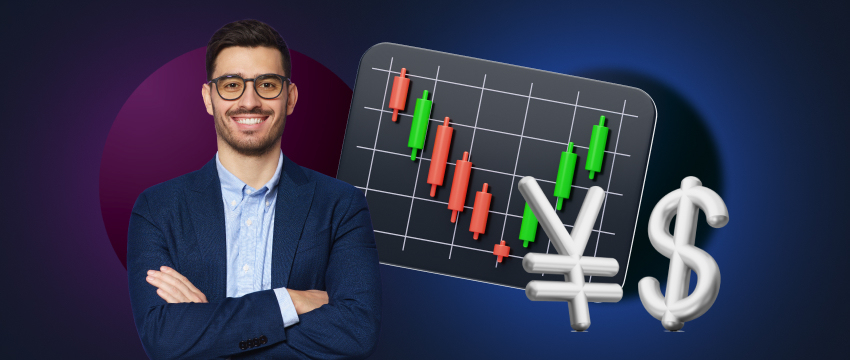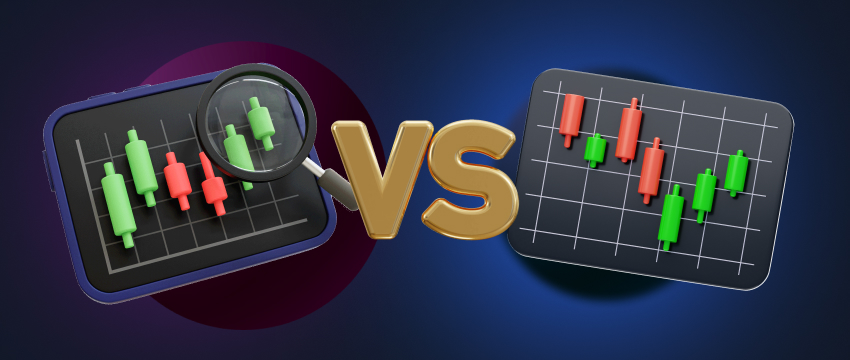CFD brokers are essentially intermediaries between traders and the financial markets. They usually offer trading platforms like MetaTrader 4 or MetaTrader 5 through which traders can access multiple financial instruments and enter/exit positions. A CFD broker attempts to generate revenue from spreads (the difference between buying and selling prices) or, where applicable, through commissions on trades.

En savoir plus sur les CFD
If you’re new to trading, you may be asking what a CFD is. Well, a CFD stands for Contract for Difference. It’s an agreement entered into by the broker and prospective trader, that enables the trader to speculate on the price movements of various underlying assets. The trader is not obligated to take ownership of this asset.
Instead, he will seek to make gains by speculating on the whether the asset’s price will rise or fall. If the trader is successful in their prediction, they will make a profit from the price difference. Adversely, if their speculation goes awry and the price moves against their prediction, the trader may incur a loss.
Why trade with a CFD broker?
There are many reasons a trader may choose to engage in some form of CFD trading. For one, this form of trading is usually highly leveraged. This means the trader is able to handle a larger position size with a significantly smaller amount of capital. As a result, the potential for maximising profits increases.
However, on the flipside, the risk for loss being magnified rises exponentially as well. Secondly, CFD brokers usually offer traders access to multiple different markets. This includes currencies, stocks, indices, commodities, metals, etc. In this way, not only do trading opportunities expand, but the trader is also able to diversify their portfolio. Third, CFD trading enables traders to capitalise on both bearish and bullish markets. They can do this by taking short positions on falling prices or long positions on rising prices. Fourth, CFDs are often times used a way to hedge against potential losses.
Finally, CFD trading is also popular in that it is considered to incur lower costs than traditional trading. There are usually zero or minimal fees for executing trades. Further, it is possible for traders to make a profit from the spreads offered by the CFD broker. In fact, when choosing a CFD broker, you will find competitive spreads due to competitive spreads are prevalent. This makes the selection process considerably more complicated.

Does CFD trading come with any risk?
Like with any other form of trading, CFD traders are at risk of substantial capital loss. This is largely attributed to the use of leverage. Financial markets are highly volatile. Asset prices rise and fall aggressively, and often unexpectedly. Positions may move against you in ways that are totally unanticipated.
Through leverage into the mix and losses become considerably larger. This makes the adoption of effective risk management techniques so important in order to protect your money. Be this stop loss or take profit orders, or more sensible position sizing, ensure you take the steps to safeguard your funds.
Additionally, be mindful of overtrading, particularly when using leverage. The ability to handle larger trades shouldn’t come at the expense of your budget. Maintain strict discipline and control. Avoid engaging in any form of excessive behaviours as this will inevitably put your money at risk. Additionally, be mindful of the fact that a CFD is a contract between you and a broker. This increases your exposure to counterparty risk if the broker happens to default on its obligations. This makes picking a reputable CFD broker that much more pivotal.

3 ways to reduce risk associated with CFD trading
Further to the implementation of stop-loss and take profit orders and optimal position sizing, there are other practical ways to reduce risk. They may be slightly less conventional but no less important. Let’s explore:
Trading-related education.
- Acquiring a proper understanding of the financial markets and the factors that drive price movements is vital. CFD traders must stay informed of any changes in market trends or developments. To do this requires ongoing learning, updating their knowledge and skills as required. A trading-related education can look different to different types of traders. It may come in the form of blogs, guides, videos-on-demand, e-books, etc. It may also take on the form of podcasts, seminars, webinars or online community forums. Many resources are free to access, offering CFD traders a multitude of ways to become better informed.
Practice, practice, practice.
- Another form of learning that involves practical learning is a demo trading account. A demo account allows a CFD trader to practice trading in a simulated trading environment using virtual funds. The demo account offers the opportunity for traders to learn how to use technical or analyse fondamentale, as well as how to apply risk management techniques. It also gives a trader as much time as they may need to become more confident in trading, without putting their own capital at risk.
Strengthening your trading psychology.
- Part of the process of becoming a more robust CFD trader is the shift away from emotive trading. CFD trading evokes strong feelings, particularly those like stress, fear, anxiety, greed, etc. They can become so overwhelming that retaining a semblance of rationality and sensibility becomes hindered. To reduce the adverse consequences of feelings like these requires building strong emotional resilience. It means being aware of what triggers certain behaviours and having the ability to manage them better. Its acknowledging that we all have character flaws, and not allowing arrogance or overconfidence overshadow objective decision making.
Choisir un courtier en CFD
One of the most important steps in the process of becoming a CFD trader is choosing a top-tier CFD broker. There are several criteria to consider in your selection, some of which we’ll discuss below.
CFD Broker: Regulations and Reputation
Firstly, make sure that the broker is regulated by a reputable financial authority. This will offer some level of protection as the broker will have to adhere to strict financial standards. Another consideration is the trading platform offered by the broker. Establish ease of use, functionality, navigation, tools, features and forms of analysis.
CFD Broker’s Demo Account
Where possible, sign up for the CFD broker’s demo trading account and test out their platform. Get a feel for what trading experience you can expect. Additionally, establish the range of assets the broker will give you access to. Ensure that you’ll be able to trade your favourite. Ascertain the level of customer support they provide. Email their customer support team, or engage in conversation via their Live Chat tool, if they have it. Ask questions you are seeking answers to in order to gage their scope of knowledge and response time.
Ressources pédagogiques
Consider the type of educational resources the CFD broker provides. This reflects the extent to which they are willing to help you become a more skilled trader. Investigate the type of spreads the broker offers, the speed and ease at which they execute trades or facilitate the withdrawal or deposit of funds. Explore the variety of trading accounts they provide. Do they cater to your specific trading needs, goals and budget? Do they align with your level of expertise?
It’s pretty clear that CFD trading offers traders a variety of trading opportunities. At the same time, it also involves inherent risk related to leverage use, market volatility, and more. Choosing a regulated CFD broker that will help you manage these challenges is crucial. So do your homework, conduct your due diligence, and pick wisely.
AVERTISSEMENT : Ces informations ne sont pas considérées comme des conseils ou des recommandations d'investissement, mais plutôt comme une communication marketing.




